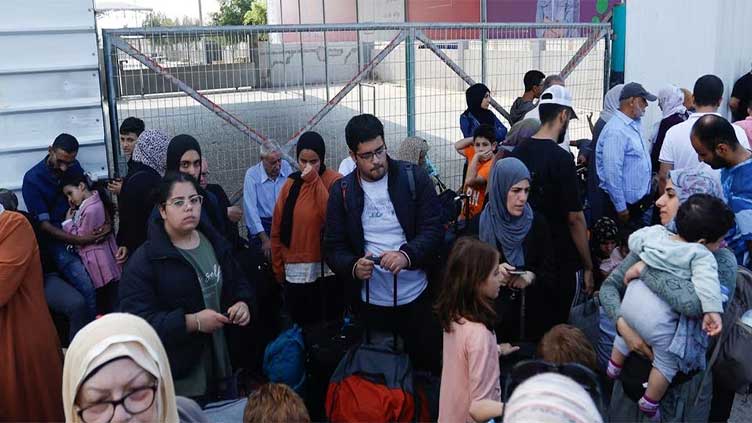US advises its citizens in Gaza to move closer to Egypt's Rafah crossing

World
US advises its citizens in Gaza to move closer to Egypt's Rafah crossing
ABU DHABI (Reuters) - The U.S. government on Saturday advised its citizens in Gaza to move south toward the Rafah border crossing with Egypt to be ready for its possible reopening amid the humanitarian crisis in the coastal enclave after a Hamas attack in Israel drew Israeli military retaliation.
Washington has been working with Egypt, Israel and Qatar to open the Rafah crossing on Saturday afternoon to allow Palestinian-Americans to leave, a senior State Department official said earlier.
"We have been trying to facilitate access for it to be open from 12 to five today. The Egyptians, the Israelis and the Qataris have been working with us on that," the official told reporters travelling with U.S. Secretary of State Antony Blinken.
Washington had been in contact with Palestinian-Americans inside Gaza, some of whom expressed a wish to leave via Rafah, but it was unclear whether Palestinian Islamist group Hamas would allow access to the crossing, the official said.
As the window for the crossing to open was about to expire, U.S. officials were unable to confirm whether any U.S. citizens were able to exit, the official added later.
"We have informed U.S. citizens in Gaza with whom we are in contact that if they assess it to be safe, they may wish to move closer to the Rafah border crossing," a U.S. State Department spokesperson said. "There may be very little notice if the crossing opens and it may only open for a limited time."
The number of dual-citizen Palestinian-Americans in Gaza has been estimated at several hundred among the strip's population of 2.3 million, and Washington hopes to get many of its nationals out of harm's way.
On the third day of his most extensive trip yet to the Middle East, Blinken met with Saudi Foreign Minister Prince Faisal Bin Farhan in Riyadh as the top American diplomat works with regional U.S. allies to prevent the war between Israel and Hamas from spiralling into a bigger conflict, and help secure the release of hostages kidnapped by the Islamist group.
Blinken also spoke by phone with China’s foreign minister, Wang Yi, and asked him to help keep the conflict from spreading, State Department spokesperson Matthew Miller said. It was the first high-level contact between Washington and Beijing since the Hamas attack and came amid heightened tensions between the two rival powers on a range of issues.
Speaking before the meeting in Riyadh, Blinken said protecting civilians on both sides of the conflict was "vitally important".
"And we're working together to do exactly that, in particular working on establishing safe areas in Gaza, working on establishing corridors so that humanitarian assistance can reach people who need it.
"None of us want to see suffering by civilians on any side, whether it's in Israel, whether it's in Gaza, whether it's anywhere else. And we're working together to do our best to protect them," Blinken said.
In remarks published by the U.S. State Department, the Saudi foreign minister said "the priority now needs to be to stop further civilian suffering".
"I have to emphasize that the humanitarian situation in Gaza is very, very difficult, and we need to work together to make sure that access for humanitarian relief and humanitarian goods is allowed," he said.
After his meeting in Riyadh, Blinken travelled to the United Arab Emirates and will meet with President Sheikh Mohammed bin Zayed Al Nahyan.


